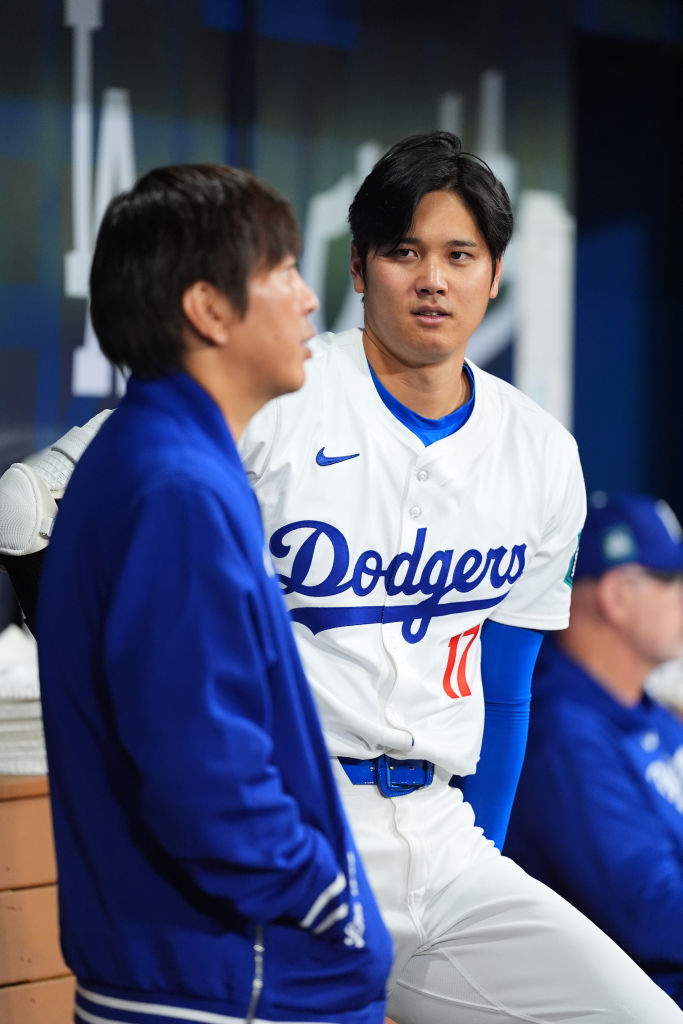


Shohei Ohtani of the Los Angeles Dodgers talks with interpreter Ippei Mizuhara during the exhibition game between Team Korea and Los Angeles Dodgers at Gocheok Sky Dome on March 18, 2024 in Seoul, South Korea. (Photo by Masterpress/Getty Images)
To say that it’s been a rough 24 hours for the Los Angeles Dodgers would be a massive understatement.
Early Wednesday, there had been a bomb threat made against Shohei Ohtani, resulting in a thorough search of the Gocheok Sky Dome in Seoul, where the Dodgers played the San Diego Padres in a pair of games to open the 2024 season. The search turned up nothing.
Then, Ohtani’s interpreter, Ippei Mizuhara, was fired by the Dodgers after it was revealed that he allegedly stole $4.5 million from Ohtani to pay debts to illegal bookmakers, and finally, Yoshinobu Yamamoto looked like Ebby Calvin Laloosh in his Major League debut.
It’s been 105 years since Arnold Rothstein and various other men of ill repute wagered on the Cincinnati Reds to win the World Series, and over a century later, the writing remains on the wall.
The writing, of course, being Major League Baseball’s Rule 21, which is posted in every clubhouse, reminding players, managers, and staff that if they gamble on baseball, they’ll be suspended for one year, and if they gamble on games involving their own team, they’ll be banned for life.
“I never bet on baseball,” Mizuhara told ESPN. “That’s 100%. I knew that rule … We have a meeting about that in spring training.”
And while it would be nice to take Mizuhara at his word, MLB commissioner Rob Manfred is now confronted with the single biggest crisis of his tenure.
Ohtani and Mizuhara’s actions must be thoroughly investigated, and the results of the investigation, regardless of what is turned up, must be released to the public, similar to the way the gambling allegations against Pete Rose were investigated by John Dowd, with the Dowd Report released to the public in June 1989.
While there is no evidence so far that Ohtani or Mizuhara was betting on baseball, the mere implication of someone so close to MLB’s biggest star racking up millions of dollars in losses with an illegal bookmaker brings up the same issues of integrity that forced the first commissioner, Kenesaw Mountain Landis, to take a hard line against those who consort with illegal gamblers. That same hard line was maintained and resulted in Rose’s ban years later under A. Bartlett Giammati.
According to ESPN, Ohtani wired $500,000 on two occasions last year to an associate of Mathew Bowyer, a California bookie Mizuhara met at a poker game who is now under federal investigation. Sports gambling is illegal in California, though it is legal in 38 other states in the U.S.
A spokesman for Ohtani made Mizuhara available to ESPN, and Mizuhara gave a 90-minute interview telling his side of the story, but then the spokesman for Ohtani disavowed the account Mizuhara gave.
Later, a statement from Ohtani’s lawyers, Berk Brettler LLP, was sent to ESPN, stating, “In the course of responding to recent media inquiries, we discovered that Shohei has been the victim of a massive theft, and we are turning the matter over to the authorities.”
The statement, of course, only creates more questions that have to be answered.
If there was, in fact, a theft, who was the thief?
If there was no theft, was Ohtani paying off Mizuhara’s gambling debts? If so, why?
The darkest question that needs to be answered – thoroughly, and through an independent investigation, the results of which are made public – remains obscured by the sheer absurdity of the entire affair.
Was Ohtani involved in illegal sports gambling, and if so, did Mizuhara take the fall for him?
One day soon, we just might find out.